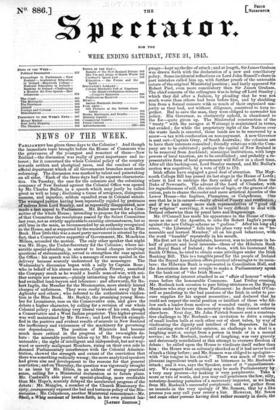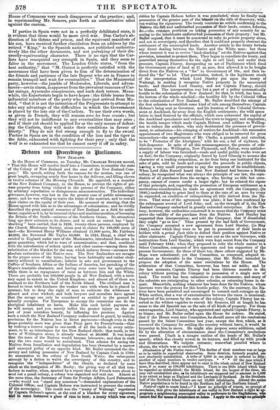NEWS OF THE WEEK.
PARLIAMENT has given three days to the Colonies l And though the immediate topic brought before the House of Commons was the grievances of the youngest and remotest of them—New Zealand—the discussion was really of great importance and in- terest' for it concerned the whole Colonial policy of the country towards settlers and aboriginal races, and the conduct of ,the official department which of all Government branches most needs reforming. The discussion was marked by talent and painstaking on all sides. * Each of the three days had its separate characteris- tics. On Tuesday, the case for the colonists and the colo • • company of New Zealand against the Colonial Office was opened by Mr. Charles Buller, in a speech which may justly be called great as well as long ; disclosing a tissue of arrogance, disingenu- ousness, and injustice, seldom equalled even in Colonial annals. The wronged parties having been repeatedly cajoled by pretences of redress from Lord Stanley, and as repeatedly disappointed, now made a last appeal to Parliament. Mr. Buller moved for a Com- mittee of the whole House ; intending to propose for the adoption of that Committee the resolutions passed by the Select Committee last year, not as strictly applicableto existing circumstances, but as still true in the main, as recommended by an authority recognized in the House, and as supported by the recorded evidence in the Blue Book. How little this was a mere party. movement is attested by the fact, that a Conservative supporter of Government, Mr. Monckton Milnes, seconded the motion. The only other speaker that night was Mr. Hope, the Under-Secretary for the Colonies; whose mi- serable special-pleading, in answer to broad charges involving questions of statesmanship, served to strengthen the case against the Office : his speech was like a message of excuse spoiled in the delivery because scarcely, understood by the messenger. The Wednesday's discussion began with a sally by Captain Rous ; Who in behalf of his absent sea-mate, Captain Fitzroy, assaulted /the Company much as he would a hostile man-of-war, with nei- ther scruple nor measuref—plainly intimating the charge that it -had swindled land-buyers and labourers : and afterwards, Sir Ro- bert Inglis, the Member for the Missionaries, more sleekly hinted charges of unfairness. They were coolly brushed away by Mr. ,Aglionby and others ; who referred to the authoritative vindica- tion in the Blue Book. Mr. Barkly, the promising young Mem- ber for Leominster, rose on the Conservative side, and gave the debate a higher character, by calling for a revision of our whole Colonial policy ; sketching very liberal views of his own, though a Conservative and a West Indian proprietor. This higher ground was well maintained by Mr. Hawes ; and Lord Howick exempli- fied in the positive and evident results of misrule in New Zealand the inefficiency and viciousness of the machinery for governing our dependencies. The 'position of Ministers had become much more critical in the progress of the two-nights de- bate : the miserable position taken up by Mr. Hope was clearly untenable ; the sight of intelligent and independent, but not way- ward or secretly malignant Members, rising on their own side to demand Parliamentary interference with the Colonial Adminis- tration, showed the strength and extent of the conviction that there was something radically wrong; the more analytical speakers had given aim and development to the reasons for that general conviction ; and on Thursday, the question was vigorously brought to an issue by Mr. Ellice, in an address of strong practical sense, calling for a Ministerial declaration as to future plans. Mr. Cardwell's able piece of special-pleading, more creditable than Mr. Hope's, scarcely delayed the accelerated progress of the debate : Mr. Mangles, a member of the Church Missionary So- ciety, courageously exposed the bad and tortuous policy of the Mis- sionaries ; Mr. Colquhoun, another Ministerial remonstrant—Mr. Shell, a Whig accusant of broken faith, in his own pointed lan- guage—kept up the fire of attack; and at length, Sir James Graham was drawn forth with the declaration of a new and conciliatory. policy. Some incidental reflections on Lord John Russell's share in past mistakes called him up, with further proofs of the untenable nature of the original Ministerial position ; and lastly appeared Sir Robert Peel, even more conciliatory than Sir James Graham. The chief concern of the colleagues was to bring off Lord Stanley ; which they did after a fashion, by pleading that he was not much worse than others had been before him, and by shielding him from a formal censure with so much of their organized ma- jority as they had, not without diligence, contrived to keep to- gether. But to save the man, they were obliged to surrender his policy. His Governor, so obstinately upheld, is abandoned to the foe—quite given up. The Mimsterial construction of the " treaty ' with the savages at Waitangi is maintained in terms, but evaded ; for while the proprietary right of the Natives over the waste lands is asserted, those lands are to be recovered by a screw—a tax with confiscation on non-payment. A new Governor is sent out—Captain Grey, of South Australia; the colonists are to have their interests consulted ; friendly relations with the Com- pany are to be cultivated ; perhaps the capital of New Zealand is to be removed from Auckland; municipal institutions, with large powers of local taxation, are to be established ; and probably, a re- presentative form of local government will follow in a short time. After all this backing-out, Lord Stanley escaped, and Mr. Buller's motion was negatived, by a vote of 223 to 172. Irish affairs have engaged a good deal of attention. The May- nooth College Bill has passed its last stage in the House of Lords; where it had to undergo the fiery ordeal of a speech from the Duke of Newcastle. The advent of the Lord of Clumber, with his regardlessness of self, the niceties of logic, or the graces of elo, cution, puts to shame the cooler and more artistical Apostles of the Lower House—the Inglises, Plumptres, or Colquhouns. One sees that he is in earnest—really afraid of Popery and retribution ; and if we had many more such representatives of " good old Tory religion" surviving, it would be very difficult to deal with Ireland otherwise than by penal laws and dragoonings.
Mr. O'Connell has made his appearance in the House of Com- mons as one of the Apostles, to echo Sir Robert Inglis's protest against the new College scheme as " godless." After his long a61 '
Bence "the Liberator" falls into his place very, well as an " ho- nourable and learned Member " all on his good behaviour, with the word "humble" repeatedly in his mouth.
His first act in the Legislature, however, was to interpose in be- half of private and local interests—those of the Hibernia Bank and Royal Bank of Ireland ; for whom, with his lieutenant Mr. Smith O'Brien, he tried to obtain some privileges under the Irish Banking Bill. This is a tangible proof for the people of Ireland that the Repeal Association offers practical advantages to its mem- bers : the Hibernia Bank is represented in Conciliation Hall, and the Association does not scruple to make a Parliamentary agent for the bank out of "the Irish Moses."
More stirring interest attached to an " affair of honour" which came before the honourable Commons. Last Friday evening, Mr. Roebuck took occasion to pass biting strictures on the Repeal Members who stay away from Parliament : he described O'Con- nell as pandering to the bad passions of the Irish in order to pro- cure supplies for his urgent necessities ; and declared that he could not respect the social position or intellect of those who fol- low such a leader from motives of wounded vanity, in order to obtain under his favour the notoriety which they cannot achieve elsewhere. Next day, Mr. John Patrick Somers sent a construc- tive challenge to Mr. Roebick—an invitation to drive a couple of small leaden balls at each other out of short tubes, by way of vindicating the dignity and intellect of the Repealers. In the still existing state of public opinion, no challenge to a duel is a laughing mattsr, except from a person in trade or in a menial service ; so Mr. Roebuck, instead of laughing, was very gravely and decorously scandalized at this attempt to overawe freedom of debate : he called upon the House to vindicate itself rather than him : the House was as solemnly shocked as if it had never heard of such a thing before ; and Mr. Somers was obliged to apologize— with "his tongue in his cheek." There was much of that un-
pleasant ingredient truth as well as bitterness in Mr. Roebuck's attack; and it was, says the Speaker, none of it " unparliament-
ary. We suspect that anything may be made Parliamentary by a very easy process—by making it very periphrastic. Take a score or two of words, and you may call gentlemen the low, silly,
notoriety-hunting parasites of a mercenary impostor, as we learn from Mr. Roebuck's successful periphrasis' and we gather from an inuendo in the very apology of Mr. Somers, that by a like process you may call your censor a liar. However, Mr. Seton and some other persons having died rather recently in duels, the House of Commons very much disapproves of the practice ; and, in reprimanding Mr. Somers, puts forth an authoritative edict against the custom.



























 Previous page
Previous page